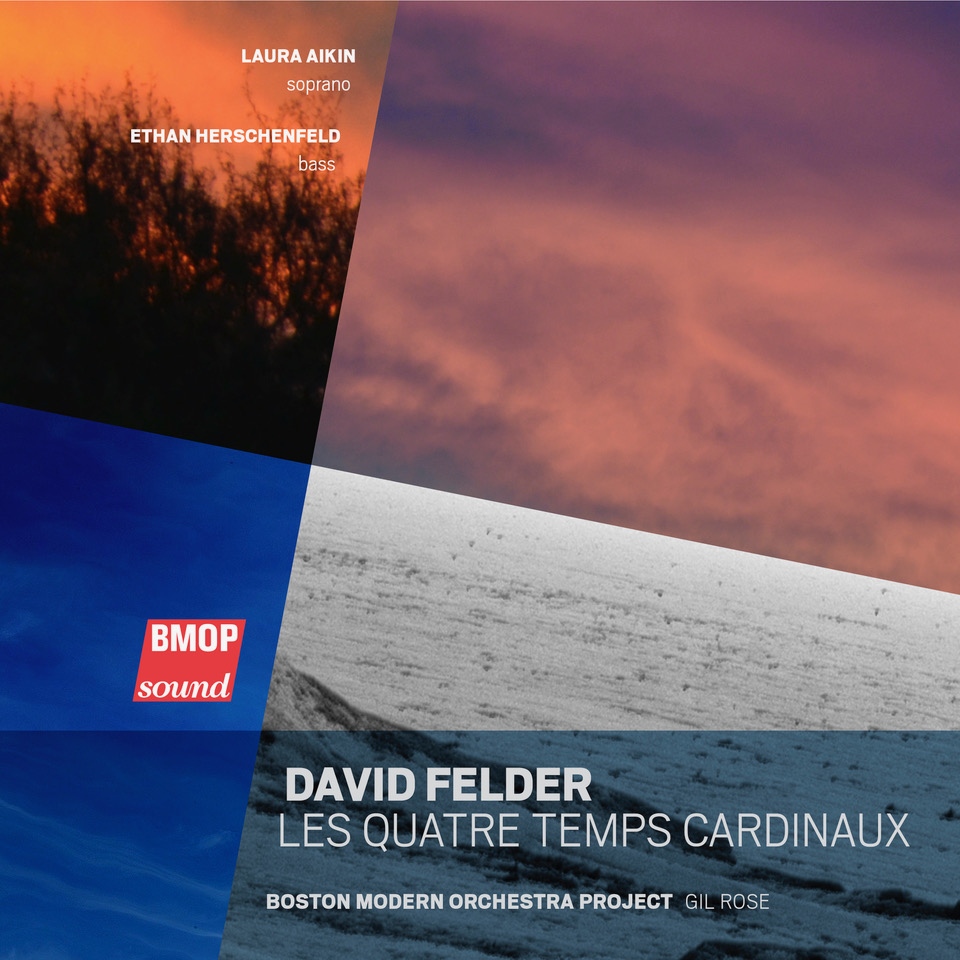- Les Quatre Temps Cardinaux
: Review
Joined by soprano Laura Aiken and bass Ethan Herschenfeld, Boston Modern Orchestra Project performs one of Felder’s most prominent pieces, Les Quatre Temps Cardinaux. This is the second recording of the piece; the other is by Ensemble Signal with members of SUNY Buffalo’s Slee Sinfonietta. Each is an assured rendition, with BMOP stressing the dramatic sweep of the piece while Signal focuses with granularity of detail. The texts Felder employs in Les Quatre Temps Cardinaux are by Réne Daumal, Robert Creely, Pablo Neruda, and Dana Gioia. Most are Daumal’s, whose work Felder discovered via Buffalo-based writer Kathleen Frederick Rosenblatt’s biography of the polymath author. Felder does interesting things to treat the texts. He intermingles electronics with the vowels of the Daumal to create an ethereal quality. One of the two movements featuring Creeley’s poems emphasizes its sibilants, the other maps the consonant attacks onto the percussion, creating an intriguing sound world. Gioia’s poem is treated to the piece’s most stentorian and angular writing, clearly distinguishing it from the other texts.
Felder was a chorister with the Cleveland Orchestra in his teens but has only recently begun to set text. His vocal writing is ambitious, operatic in scope and compass. The piece opens with a series of spectral chords, over which Aiken’s voice soars, effortlessly managing pianissimo dynamics and altissimo high notes. She is worthily matched by Herschenfeld’s resonant low notes and seamless legato phrasing. The first section culminates in a rapturous duet in which the vocalists both navigate their upper registers fluently. In the section “Fragments (from Neruda),” an impressively thunderous tutti orchestral passage is matched by clarion singing from Aiken. A rousing duet rendition of Daumal’s “Stanza 3b” matches the Neruda’s intensity, and “Stanza 4a” is treated to a sepulchral solo by Herschenfeld in which he is accompanied by intertwining brass. He goes still lower on “Stanza 4b,” shadowed by sustained chords that move from strings to brass. Then, the vocal line is mimicked in counterpoint by the lower brass. Timpani thrumming is juxtaposed against choral-like passages as the piece moves into an instrumental postlude in which a clamorous buildup of drums heralds the final entrance of Aiken, her arcing solo haloed by trumpet glissandos, ascending to her top register and then plummeting down to conclude the piece.
Throughout, BMOP plays impressively. Rose shapes the piece beautifully and provides a detailed account of its myriad details. Hopefully, Les Quatre Temps Cardinaux will be followed by more vocal music from Felder. It is a formidable entry into his catalogue of works. Recommended.
